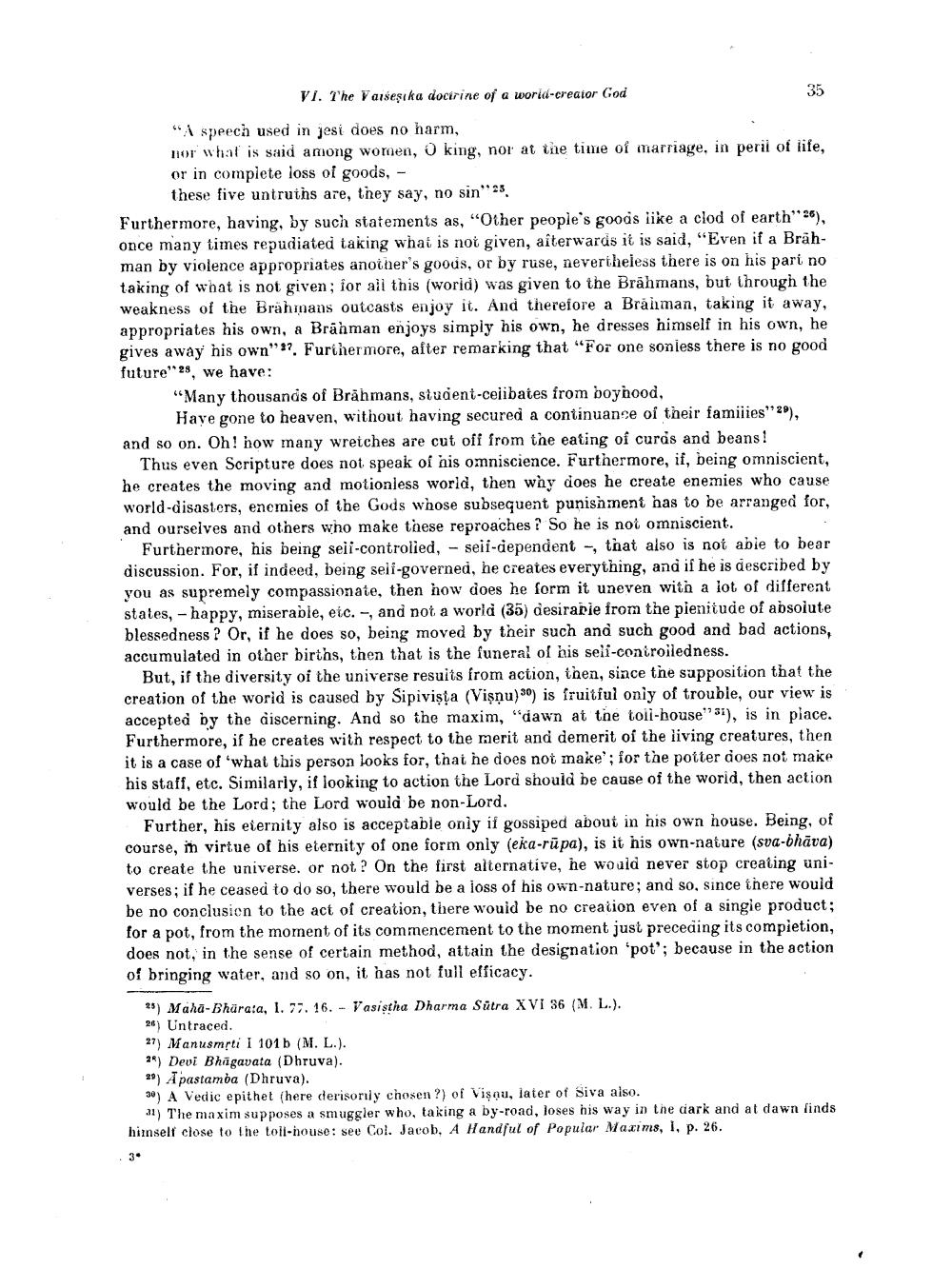________________
VI. The Vaiseşika doctrine of a world-creator God
"A speech used in jest does no harm,.
nor what is said among women, O king, nor at the time of marriage, in perii of life, or in complete loss of goods. -
these five untruths are, they say, no sin" 25.
Furthermore, having, by such statements as, "Other people's goods like a clod of earth" 26), once many times repudiated taking what is not given, afterwards it is said, "Even if a Brahman by violence appropriates another's goods, or by ruse, nevertheless there is on his part no taking of what is not given; for all this (world) was given to the Brahmans, but through the weakness of the Brahmans outcasts enjoy it. And therefore a Brahman, taking it away, appropriates his own, a Brahman enjoys simply his own, he dresses himself in his own, he gives away his own"". Furthermore, after remarking that "For one sonless there is no good futures, we have:
35
"Many thousands of Brahmans, student-celibates from boyhood,
Have gone to heaven, without having secured a continuance of their families" 2"), and so on. Oh! how many wretches are cut off from the eating of curds and beans!
Thus even Scripture does not speak of his omniscience. Furthermore, if, being omniscient, he creates the moving and motionless world, then why does he create enemies who cause world-disasters, enemies of the Gods whose subsequent punishment has to be arranged for, and ourselves and others who make these reproaches? So he is not omniscient.
Furthermore, his being self-controlled, seii-dependent, that also is not able to bear discussion. For, if indeed, being self-governed, he creates everything, and if he is described by you as supremely compassionate, then how does he form it uneven with a lot of different states, happy, miserable, etc., and not a world (35) desirable from the pienitude of absolute blessedness? Or, if he does so, being moved by their such and such good and bad actions, accumulated in other births, then that is the funeral of his self-controlledness.
But, if the diversity of the universe resuits from action, then, since the supposition that the creation of the world is caused by Sipivista (Vişnu) 30) is fruitful only of trouble, our view is accepted by the discerning. And so the maxim, "dawn at the toii-house"), is in place. Furthermore, if he creates with respect to the merit and demerit of the living creatures, then it is a case of 'what this person looks for, that he does not make'; for the potter does not make his staff, etc. Similarly, if looking to action the Lord should be cause of the world, then action would be the Lord; the Lord would be non-Lord.
3.
Further, his eternity also is acceptable only if gossiped about in his own house. Being, of course, in virtue of his eternity of one form only (eka-rupa), is it his own-nature (sva-bhāva) to create the universe. or not? On the first alternative, he would never stop creating universes; if he ceased to do so, there would be a loss of his own-nature; and so, since there would be no conclusion to the act of creation, there would be no creation even of a single product; for a pot, from the moment of its commencement to the moment just preceding its completion, does not, in the sense of certain method, attain the designation 'pot'; because in the action of bringing water, and so on, it has not full efficacy.
25) Maha-Bharata, 1. 77. 16. Vasistha Dharma Sutra XVI 36 (M. L.).
26) Untraced.
27) Manusmrti I 101 b (M. L.).
2) Devi Bhagavata (Dhruva).
29) Apastamba (Dhruva).
30) A Vedic epithet (here derisorily chosen?) of Visau, later of Siva also.
31) The maxim supposes a smuggler who, taking a by-road, loses his way in the dark and at dawn finds himself close to the toll-house: see Col. Jacob, A Handful of Popular Maxims, I, p. 26.




